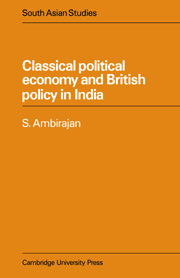Book contents
- Frontmatter
- Contents
- Dedication
- Acknowledgments
- 1 Introduction
- 2 Economic ideas and British policy towards India
- 3 Economic ideas and famine policy
- 4 Economic ideas and economic relations
- 5 Economic ideas and land taxation
- 6 Economic ideas and taxation policies
- 7 Political economy and a policy of economic development
- 8 The state and the policy for economic development
- 9 Conclusion
- Select bibliography
- Index
6 - Economic ideas and taxation policies
Published online by Cambridge University Press: 31 March 2010
- Frontmatter
- Contents
- Dedication
- Acknowledgments
- 1 Introduction
- 2 Economic ideas and British policy towards India
- 3 Economic ideas and famine policy
- 4 Economic ideas and economic relations
- 5 Economic ideas and land taxation
- 6 Economic ideas and taxation policies
- 7 Political economy and a policy of economic development
- 8 The state and the policy for economic development
- 9 Conclusion
- Select bibliography
- Index
Summary
There is hardly a source of Indian Revenue that political economy would quite approve if there were a choice
Lord LyttonIn questions of taxation in India, it seems to me that political considerations are fully as important as a perfect agreement with the principles of political economy
Lord NorthbrookINTRODUCTION
Until the imposition of an income-tax in India in 1860, virtually all taxation except land revenue was indirect. In a way, this predominance of indirect taxation was not counter to prevailing economic opinion in Britain. Both Adam Smith and Malthus had described indirect taxes as not very welcome although necessary. Ricardo thought that indirect taxes on luxuries were to be preferred to income and other direct taxes. Mc-Culloch felt that practicability was more important even than equity and hence indirect taxation was to be preferred to direct taxation, as the former stimulated ingenuity and invention. As a rule the Classical economists preferred no taxation to any particular form of taxation. If indirect taxes affected the allocation of resources, direct taxes had the disadvantage of reducing the capital resources available for investment. Hence it would be very difficult to deduce a set of policy prescriptions regarding taxation that would find favour with all Classical economists. The only set of criteria which every economist accepted were the four canons of taxation prescribed by Adam Smith: certainty, economy, convenience and equality.
- Type
- Chapter
- Information
- Classical Political Economy and British Policy in India , pp. 182 - 213Publisher: Cambridge University PressPrint publication year: 1978

